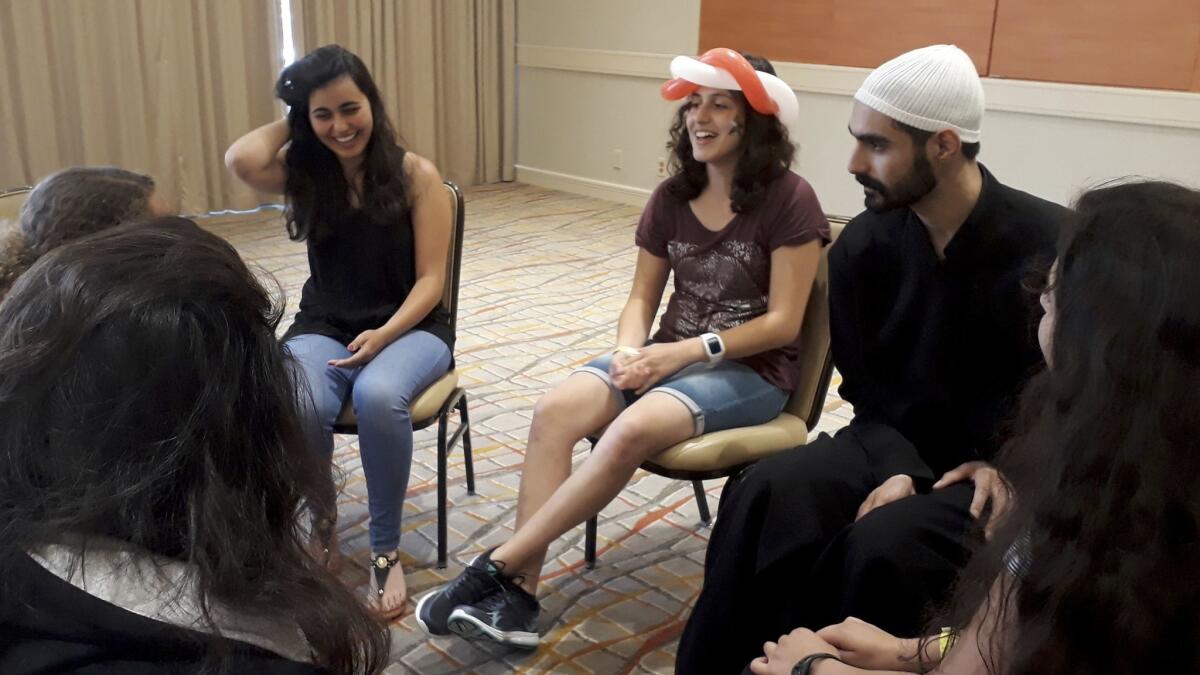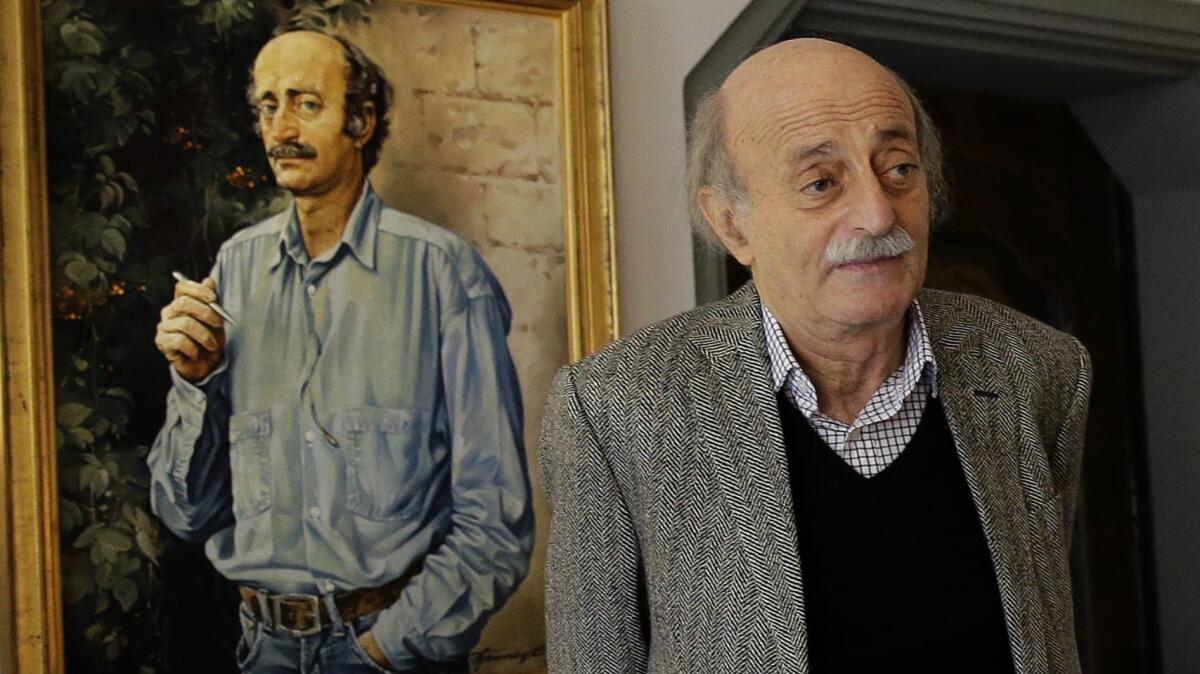Finding a life partner is hard enough. For those of the Druze faith, their future depends on it

- Share via
Reporting from BEIRUT — Reem Kaedbey was never very religious. She’s not even sure there is a God.
But when it came to marriage, she never had any doubt she would choose within her family’s sect, a tiny offshoot of Shiite Islam known as the Druze faith.
“It’s a requirement for my parents,” said 28-year-old Kaedbey, who lives near Beirut and works for the United Nations. “I didn’t want to get into problems.”
Finding a life partner is hard enough for anybody. Members of the Druze faith face an added pressure: keeping the religion alive.
The faith is thought to have about 1.5 million members, with most living in Lebanon, where they make up 5% of the population, and Syria, where they make up 3%. But an exodus of people fleeing wars in those countries has fueled a small but growing diaspora. There are about 30,000 in the United States, with the largest concentration in Southern California.
While the Internet has made it easier for Druze to connect with each other — Kaedey met her husband on social media — growing contact with the outside world has increased the chances that members will marry outside the faith. That is a path to extinction, because the religion does not accept converts and in its more conservative strands rejects children of mixed marriages.
“In the modern day, there’s a lot more tolerance and acceptance, but for the ones who truly follow the faith, once a person marries a non-Druze, they took the decision of leaving the faith,” said Daniel Halabi, a 22-year-old sheikh, or religious leader, who lives in Chicago. “The religious laws are clear.”
And so the future of the Druze faith may depend not only on pairing up its youth — a community effort — but also on whether the religion itself can make accommodations to the modern world.
As religions go, the Druze faith is not especially old, having been formed roughly 1,000 years ago. It accepted the prophets of Islam and Christianity and incorporated elements of Greek philosophy and Gnosticism.
Unlike other forms of Islam, it embraced reincarnation, allowed women to become religious leaders, banned men from having multiple wives and did not mandate prayer at set times or places.
Its most important early promoter was Al Hakim bi-Amrillah, the sixth leader of the Fatimid Caliphate that spanned a large area of North Africa and the Middle East and had its capital in Cairo. After his mysterious disappearance, his followers in Egypt were exterminated.
But they survived in other areas of the Middle East, including in present-day Lebanon and Syria.
In 1044, after a brief period of proselytization, the faith was closed to converts. Early Druze communities were insular and isolated and left historians with few records.
The religious texts have never been widely disseminated, leaving it to the sheiks to educate adherents on the finer points of the faith.
The diaspora began as a trickle and picked up in 1975 with the beginning of Lebanon’s 15-year civil war. The country’s 2006 war with Israel spurred more to leave, and most recently, many Druze have joined the stream of refugees from Syria’s civil war.
As Druze members have branched out, many have lost touch with the religion, raising existential questions about its future.
“Very few of them have an in-depth understanding of their dogmas,” said Chad Kassem Radwan, an anthropologist of Lebanese Druze descent who wrote a doctoral dissertation for the University of South Florida on Druze identity in Lebanon. “How do you preserve your heritage? This is truly the seminal issue of the Druze community.”
He and most Druze who care give the same answer: marriage.
Marrying outside the faith is a betrayal that is not easily forgiven.
“Our children always ask me, ‘Why do we have to marry a Druze? What if I fall in love with someone not Druze?’ ” said Anita Dakdouk, who was born into a Lebanese Druze family in Venezuela and now lives in Valencia , where she and her Druze husband run a coffee company. “I tell them, ‘Don’t think about yourself only, because there is family involved.’ ”
Those who stray are often ostracized by their families and sometimes by the larger community. In one instance Radwan found in his research, a Druze man was going to marry a woman of Shiite and Christian heritage. When the neighbors found out, they visited his parents to express condolences on the loss of their son, as if he had died.
In a case that made headlines four years ago, a Druze woman and Sunni man from northern Lebanon eloped. The bride’s family hunted the groom down and cut off his penis.
Some members of the faith are pushing back on the rules.
Walid Jumblatt, head of the Progressive Socialist Party in Lebanon and perhaps the country’s most prominent Druze figure, married outside the religion.

On identification documents, the Lebanese government considers anybody with a Druze father to be Druze, even if the mother is not — a concept that has been embraced among more liberal adherents to the faith.
“Yes, yes, they are Druze,” said Hassan Sleem, a Druze resident of Beirut who runs a translation service. “We are a small community. We need more people.”
Rima Muakkassa, who lives in Akron, Ohio, where there about 100 Druze families, said that while she never considered marrying outside the religion, her four children could do as they wished.
“In the end, it’s not by force. We believe in free will,” she said. “The purpose is to enlighten and guide our children so they can make the right choices.”
From a practical point of view, the biggest challenge to finding a spouse within the faith is the shortage of other Druze, especially outside the Middle East.
Many second-generation children of the diaspora visit Lebanon or Syria in hopes of finding a husband or wife — with mixed success.
Kaedbey’s husband, Firas Talhouk, recalled a cousin from Miami whose parents sent him to Lebanon one summer.
“All his mom’s friends stacked up their daughters and he was so happy,” Talhouk said. “He dated one each night and he’s like, ‘You know what, cuz? … I’m coming next summer, man.’ But he didn’t marry any of them.”
In the United States, annual conventions of the American Druze Society, which is based in San Antonio, have become a well-known matchmaking ground, with mixers and outings aimed at young people always on the schedule alongside religious presentations.
Muakkassa, the society’s current president, met her husband at a convention, as did the the vice president, Labiba Harfouch, and her daughter. Some gatherings have included weddings.
But the conventions are not for everyone. Halabi, the young sheikh in Chicago, said the first time he attended one he left the singles night after an hour because it was at a bar and alcohol was flowing. As a strict adherent to the faith, he does not drink.
He complained to the society’s leadership, which led to his teaching religious sessions for the children at this year’s convention in Irvine.
Halabi, who is now in college, said he eventually wants to return to Lebanon, where he grew up, to marry and start a family with a Druze woman with similar religious views. But for now, he sees his mission as reaching the younger generation of Druze living in the United States.
“If they don’t know their identity, it’s easy to have them dissolve in the society we live in,” he said. “Once we abandon being Druze, we are just like all the other people around the world who have no identity.”
Sewell is a special correspondent.
More to Read
Sign up for Essential California
The most important California stories and recommendations in your inbox every morning.
You may occasionally receive promotional content from the Los Angeles Times.










